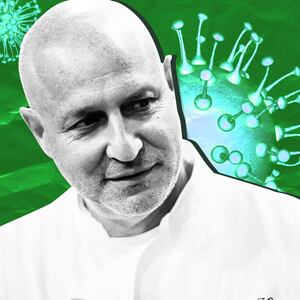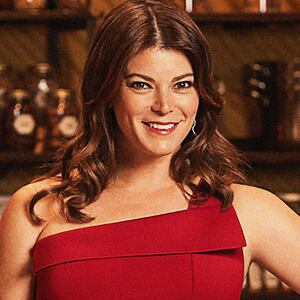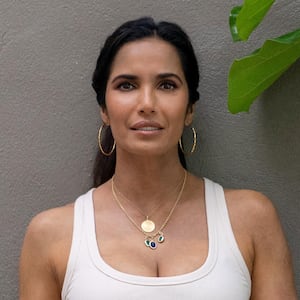Chef Tom Colicchio has spent much of the past two years fighting to save the restaurant industry. It hasn’t left him that much time to actually eat in any of the restaurants he’s trying to help.
“I really don’t get out that much,” the head judge of Top Chef and founder of the Crafted Hospitality restaurant group admits when I ask him about the last great thing he ate. Instead, he mentions the simple pasta dish with bacon, peas, and olive oil that he cooked for himself the night before.
The notion that elaborate does not necessarily equal delicious is a theme that has run through all 19 seasons of Top Chef, which returns tonight on Bravo from Houston, Texas. The quality of both the ingredients and the show’s production values may have increased since it first premiered 16 years ago this week. But Colicchio’s dedication to food that tastes good above all else has never wavered.
The Emmy Award-winning show is so beloved by the food world at this point that it is often held to a higher standard than other, nastier reality shows. So when news came out around last season’s finale that winner Gabe Erales had been fired from his job as executive chef at Austin’s Comedor for alleged violations of the restaurant’s sexual harassment policy—two months after Top Chef’s 18th season had wrapped—fans demanded answers.
Top Chef host Padma Lakshmi tweeted at the time, “As someone who has been sexually harassed, this topic is a serious one and merits openness. We filmed Top Chef in October of last year & were not aware of the allegations now coming out about Gabe. This should be investigated & the network should consider its best action.” She then added, “To be clear, no one has alleged sexual harassment on the record or otherwise to Bravo/Top Chef and we judges didn’t have any indication of inappropriate behavior from Gabe during his time on set.”
Erales’ chef/partner at Comedor, Phillip Speer, said that Erales was “fired for repeated violations of the company's ethics policy as it relates to harassment of women.” Erales eventually broke his silence, apologizing to his wife and claiming that he’d had a “consensual relationship with a co-worker and later reduced her work hours, which in combination was a poor judgment call and led to my termination after I filmed Top Chef.” (We have yet to hear his alleged victim’s side of the story.)
Until now, Colicchio had not addressed the controversy in any way, and in this interview says the fact that he met his own wife when she was working for him in a restaurant plays into his reluctance to condemn Erales’ behavior. Below is an edited and condensed version of our conversation.
The last time we talked was almost two years ago when you were making some extremely dire predictions about the restaurant industry. So I was curious, how are things looking to you now?
You know, not great. And things were fine leading up to December or getting better. But then Omicron really put us back on our heels again. One of the bigger problems—the Independent Restaurant Coalition, we managed to get a big chunk of money for restaurants. We got $28.6 billion, which sounds like a lot of money. And I guess it is, but of all the applicants that applied for the grants, only one third of the applicants actually got money.

Top Chef co-host Tom Colicchio chats with contestants
BravoOh wow.
And so we spent all this time lobbying the government to help us out and they did, but it was really under-serviced. And so for the restaurants that got money, they’re in great shape. The restaurants that didn’t get money, they’re at a real competitive disadvantage. If the guy down the street got a million bucks, they can offer more salary, they can renovate, they can do things. Whereas if you didn’t get the money, you’re kind of screwed.
Was there any rhyme or reason to who got money and who didn’t?
Well, the way the bill was originally written, women-owned, minority-owned and veteran-owned businesses were supposed to get first crack at it. And then there was a lawsuit that stopped that. And so then after that, it was just random.
So some people were just unlucky.
Yeah, so we’re back, trying to get another $40 billion, which would cover everything. And we’re close, but who knows?
Have you seen any permanent changes to the industry, things that changed during COVID that you don’t think are going back?
It’s hard to say right now. I think restaurants are going to try to find revenue streams wherever they can find them. But I also think, just knowing how restaurants run, that if we get back to full capacity, a lot of these little side things that people are doing are going to go to the wayside because they’re not going to have the bandwidth to do them. In terms of things like equity and inclusion, that was happening before the pandemic. I also think a lot of restaurants are reevaluating the deals they have with the take-out companies, because when they charge 30 percent, it’s impossible for us. So I think that’s changing rapidly.
So before we get to the new season of Top Chef, I have to tell you how much I loved the previous season. That was really the first one that you did mid-pandemic. And this is something I actually talked to Gail [Simmons] about, but the stakes just felt so much higher due to what it means to be a chef right now. Do you agree that it felt like a different show and different stakes given the situation?
It definitely felt like a different show just in terms of the production. But in terms of the show, I think that just like the industry has moved to be a little gentler and nicer, and that rough-and-tumble stuff just doesn’t cut it anymore, I think if you actually look at Top Chef, I think Top Chef mirrors that, culminating in the Portland season, where all the chefs were so cooperative with each other. If they’re going to win, they’re going to win doing what they’re doing. They’re not going to win by bickering and fighting and trying to make somebody else look bad. And I think that’s the way our industry has moved and I think it’s reflected in the show.
In terms of production and getting a show out, the stakes felt higher, because at any second, if something happened, if we had an outbreak, we would have been shut down. And from the very beginning, we wanted to get the show done. At the beginning of the pandemic, I was calling producers saying, “We’ve got to shoot a show, we’ve got to figure this out.” I think it’s important to show that we’re still standing and that we can still produce something really good, even with the restrictions. And quite frankly, I think some parts of the show were actually really great because of the pandemic. Like Restaurant Wars, like having the past contestants embedded with us because we couldn’t fly people in and out. And so we asked them to stay with us and quarantine with us and that turned out to be great.
And the other thing that’s kind of interesting—and I think we can definitely see in the Houston season—is that all these contestants have grown up watching Top Chef. We started 16 years ago, so a lot of these chefs in their late twenties have been watching us for 18 seasons and it’s kind of neat. It feels like the combination of the contestants and the show itself, that we’ve matured. And it’s become a real rite of passage for the chefs to come on the show.
Given that it has become this kinder environment in some ways, on the flip side of that, last season was tainted a bit by everything that came out afterwards about the winner, Gabe Erales, and the allegations against him. I know Padma [Lakshmi] addressed it a bit on Twitter, I don’t believe you have. And since you you’ve spoken out against sexual harassment in the industry before, I just wanted to know, how did you feel when you found out about his alleged behavior?
Well, I mean, you know, it’s in the past. But I’m not sure what we’re talking about because nothing’s really come out.
The story was about a relationship with someone who worked for him who was subsequently fired. And I think that was what people were pointing to as concerning.
Yeah. But I think what happens is, you know, something comes out and sexual harassment is talked about—this certainly didn’t rise to the occasion of some of the other chefs, some of the stuff that they were doing or allegations of rape and things like that. So I’m not saying any of it’s acceptable, but also, we never once heard from the woman who he had an affair with and it was a consensual affair.
Did it have any effect on the vetting process for the chefs on the show moving forward after that?
I’m not involved in the vetting process, so I’m not sure, but I’m sure it did. It’s a pretty lengthy process and there’s all kinds of evaluations that are done. And when we were aware of it, it was after the fact, so there wasn’t a whole lot we could do.
Of course. That’s why I'm asking whether it had an effect moving forward, but if you’re not involved in that part of the process, then I understand.
No, I’m not involved in that. But I think, the first season aside—we had some real difficulties with one of the contestants—after the first season they got much more strict. So we vet people very, very closely. So it’s unfortunate that allegations like this were made, because [Gabe] is a very talented chef and he won his season. You can’t take that away from him. And I’ll just say one more thing. You asked me if I spoke out against it. My wife worked for me and she was a server in a restaurant that I worked at. So we had a consensual relationship, we fell in love and got married. That said, personally, in my company, we have a non-fraternization policy. So when these allegations were made and we found out that Gabe was let go, my assumption was that the company he worked for had a non-fraternization policy. Originally, we were told he “broke policy.” What the hell does that mean? That’s all we were told.

Top Chef winner and accused sexual harasser Gabe Erales leads a toast
BravoIt was very vague at first.
Until the day of our finale, then it was called sexual harassment. Prior to that, we were told he was fired for breaking violations, for breaking policy. That could be anything. So really, I have nothing to say, because a lot of it was just rumor and innuendo. I mean, he got fired. That’s between him and his boss, really.
Alright. So let’s move on to the new season. I got to see the first episode and really enjoyed it. Can you talk a little bit about Houston as a food city and why you wanted to do the show there?
I think it’s a great food town. I think it’s a really underrated food town. And part of the reason is there’s not a lot of tourism in Houston. There’s a great scene there. And it’s a really, really diverse scene. There’s great Latin food, there’s great African food, there’s amazing Vietnamese food. Eventually, we’re going to hit every major city and so it just made sense.
I feel like, for a lot of the viewers, it will change their preconceived notions about what Texas is. And I’m wondering if it had that effect on you at all, even just spending time there filming the season.
I had spent a little bit of time in Texas, and in Houston, prior to this. But I think so. I think when they see the season, especially the complete season, and what we do and who we work with, I think they’re going to look at Houston as being maybe a little eye-opening and something they didn’t realize.

Tom Colicchio speaks during a news conference with Democratic lawmakers about hunger and nutrition outside the U.S. Capitol October 26, 2021, in Washington, D.C.
Drew Angerer/GettyWatching the show over many years, it seems like the level of chefs has just increased in their abilities and skill and experience every year, and this one is no exception. I’m thinking especially of someone like Chef Luke Kolpin, who worked several years at Noma. But at the same time, we see him, in the first episode, struggle to compete on Top Chef compared to what his experience was like professionally. It’s a good example of how restaurant experience doesn’t necessarily help you succeed on this show.
Well, if you don’t have restaurant experience, I don’t believe you can compete on the show. That said, certain chefs are just better suited for this kind of competition where you’re thinking on the fly. You’ve got to commit to something right away. You don’t have time to tinker. There are some chefs that don’t work that way. It doesn’t mean they’re good or bad. It’s just, that’s their process. So I think the show maybe is better suited toward the chef who can really shoot from the hip. There’s no right way or wrong way. But someone also, who has a lot of experience in one kitchen, they get used to doing things a certain way. And they rely on certain things that are in that kitchen. And a great kitchen like Noma is like that. There’s things that are there, that are available to them. And keep in mind, unless you’re the executive chef in the restaurant, or maybe chef de cuisine, you’re not the one who’s creating stuff. You’re just cooking. It’s very different when you have to be creative and own it.
Like you mentioned, these chefs have grown up watching the show over many years now. How do you feel like the show’s longevity has affected the way people compete? The fact that they know how to do things from watching the show as much as they know how to do things from their actual real-world experience.
I think real-world experience probably has a lot more to do with it. I think sometimes they think they have it figured out. “Tom likes this.” They have no idea what I like. They know I don’t like okra.
Well, everybody knows that!
I like everything and if you put okra in front of me, I’ll eat that too. I’m not going to tell you to go home because you made me okra.




